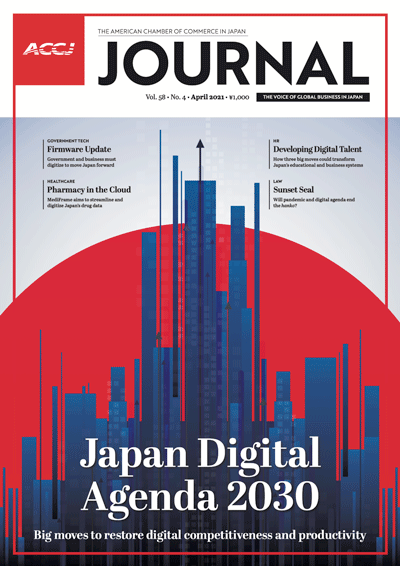Pharmacy in the Cloud
MediFrame aims to streamline and digitize Japan’s drug data
By Malcolm Foster
As a former pharmacist at a university hospital, MediFrame, Inc. Chief Executive Officer Atsushi Wada was familiar with the pressures and challenges faced by Japanese doctors: increasingly complicated and personalized medications, a lack of time to read up on and learn about these new treatments, and a growing number of elderly patients.
Atsushi Wada
CEO MediFrame, Inc.
“Some of these drugs have been created as a result of advanced, Nobel Prize-worthy scientific breakthroughs. But many medical professionals have their hands full just caring for their patients and don’t have the time to learn about these medicines,” Wada said.
Compared with other major economies, Japan has fewer doctors per capita—2.4 per 1,000 people—while the average is 3.5 for members of the Organisation for Economic Co-operation and Development. Pharmaceutical companies have plenty of information about each drug, including possible side effects, but that information wasn’t reaching doctors simply because they didn’t have time, or it was a hassle, to look it up.
Noticing this, Wada saw a need—and an opportunity. He quit his job and has spent the past three years creating a platform that makes it easier for doctors to readily access information about the myriad drugs on the market.
The result is MediFrame, a startup that won the Best Value Proposition prize at the American Chamber of Commerce in Japan (ACCJ) Healthcare x Digital competition on December 1.
The event was driven by a group of ACCJ committees—Healthcare; Alternative Investment; Information, Communications and Technology; and Secure Digital Infrastructure—and led by ACCJ Corporate Sustaining Members AstraZeneca K.K., Bayer Yakuhin, Ltd., and Deloitte Touche Tohmatsu LLC, as well as President’s Circle Member Eli Lilly Japan K.K. The ACCJ-Kansai Chapter played a key role in organizing the competition.
The ACCJ Journal caught up with Wada to learn more about his experience pitching his business concept, and the challenges he has faced.
What problems are you addressing?
Japan is facing a shortage of medical staff—doctors, nurses, even pharmacists—as the elderly population grows. At the same time, medication is becoming increasingly personalized. That means the number of drugs medical staff need to know about is expanding dramatically.
MediFrame is a cloud-based system that links to pharmacy systems and allows doctors to quickly get information about the many drugs available. Because MediFrame provides personal information necessary for treatment linked to a patient’s prescription data, pharmacies sign a contract with us to set up an account that protects personal information in compliance with privacy laws and other guidance.
Who are you mainly trying to help?
Japan has a shortage of doctors—there is more demand than supply—so that’s one thing we’re trying to do, to help make doctors’ jobs easier. But, through them, of course we’re also trying to help patients.
Medication is becoming increasingly personalized. That means the number of drugs medical staff need to know about is expanding dramatically.
In many cases, with today’s advanced drugs, simply taking medicine isn’t enough; the treatment needs to be carefully controlled. For a drug to be truly effective, doctors need to have knowledge of its effectiveness and possible side effects, and then relay specific instructions to their patients.
Tell us about your background and how you got to this point and started MediFrame.
I was a pharmacist at Kobe University Hospital, and I gained experience helping launch various new operations. I helped set up satellite pharmacies in departments such as the intensive care unit.
I’m an oncology specialist, so I also helped set up an oncology team at the hospital. When the university hospital established an affiliated hospital, I assisted by becoming a member of the staff and helping set up clinical trials. I also played a role in inaugurating an academic society that has grown to about 4,000 members.
I also had gained a lot of experience early on working with people outside the hospital, through activities such as conferences and training sessions, so I was able to think about both the hospital and the healthcare system as a whole.
But I found that a lot of my colleagues across the industry kind of lacked a bird’s-eye view of the entire healthcare system and thought only in terms of improving their specific situation, not the overall process. I also saw that they lacked tools to make their jobs easier and streamline interactions within the system.
So, I realized that to really have a broader impact myself—and to help others do the same—I was in a unique position to start a company that could benefit wider society. As a pharmacist, I had experience in setting up various projects, so I thought that, too, might be used to launch a business. And that was the start of MediFrame.
When did you launch the business?
We really began last spring. The company was formed in October 2017, but it took about two and a half years to gather information and input from many people and, through trial and error, to develop the platform. We’re still small and I’m the only full-time employee. I formed this company by myself, although I have received help from a number of people.
The system is still in development and isn’t being used yet. I’m looking for a partner with whom I can test the product, and also for investors who can support this project. I hope to have people actually using it within this year.
Japan is mostly risk averse. Are attitudes changing?
A little. But people like me are still definitely in the minority. When I started this, some of my colleagues were really surprised about the venture. So, I believe even now there aren’t many people who are willing to take risks.
How has Covid-19 impacted your plans?
Because of the pandemic, I couldn’t meet key people. We were able to connect online but, because we didn’t meet in person, the decision-making stalled. However, I did get support from a lot of people, including friends and former colleagues, who gave me advice. A lot of them told me my project was important and necessary, and that encouraged me.
Has the coronavirus pandemic drawn attention to Japan’s doctor shortage?
Yes, it has. What we’re trying to create is a system for distributing drug information online, and online doctor’s visits and treatment have expanded during the pandemic. Information that was, until now, printed on paper or in a book is being transferred digitally. So, I think the pandemic has helped people realize the value of this.
Does MediFrame help the Japanese medical system save time and money?
Not directly. But it can raise the quality of phone and online treatment. Now there are various online systems, and a single patient often uses multiple clinics, each of which uses a different system. We hope that our platform will help streamline these systems and benefit patients.
Also, at the end of 2019, the law concerning pharmacists changed. One new requirement is that pharmacists must call patients between doctor visits to check whether they are taking their meds properly, and whether there are side effects. That came into force last September.
Pharmacists were not accustomed to doing this, so it was hard to know the best time to contact patients based on factors such as when the drugs might have side effects. We are trying to provide this kind of information through the service that we are setting up, so that patients can receive the best follow-up care.
How as your Healthcare x Digital competition experience?
It was a good experience for me. I was really nervous. The other two companies that won prizes were excellent businesses with longer track records. My company didn’t even have a product on the market yet. So, I was surprised; but I was also very happy that my concept was recognized.
AstraZeneca, Bayer, and Lilly were the main sponsors. For them to see the potential in my company made me feel very pleased and encouraged. I thought my company was benefitting pharmaceutical companies.
How will your Healthcare x Digital win benefit you?
One part of receiving this award is that I get to meet with executives from each of the three big firms, so I’m really looking forward to that valuable experience. I hope I can get their cooperation and support, and when we meet I should also be able to hear what sort of topics they are dealing with, so that will be very valuable.
What advice do you have for those considering entering this year’s Healthcare x Digital competition?
The focus is on healthcare, so thinking about how to help patients is key. Focusing on the end goal of what will be delivered to patients is important.
THE JOURNAL
Vol. 58 Issue 4
A flagship publication of The American Chamber of Commerce in Japan (ACCJ), The ACCJ Journal is a business magazine with a 58-year history.
Christopher Bryan Jones, Publisher & Editor





